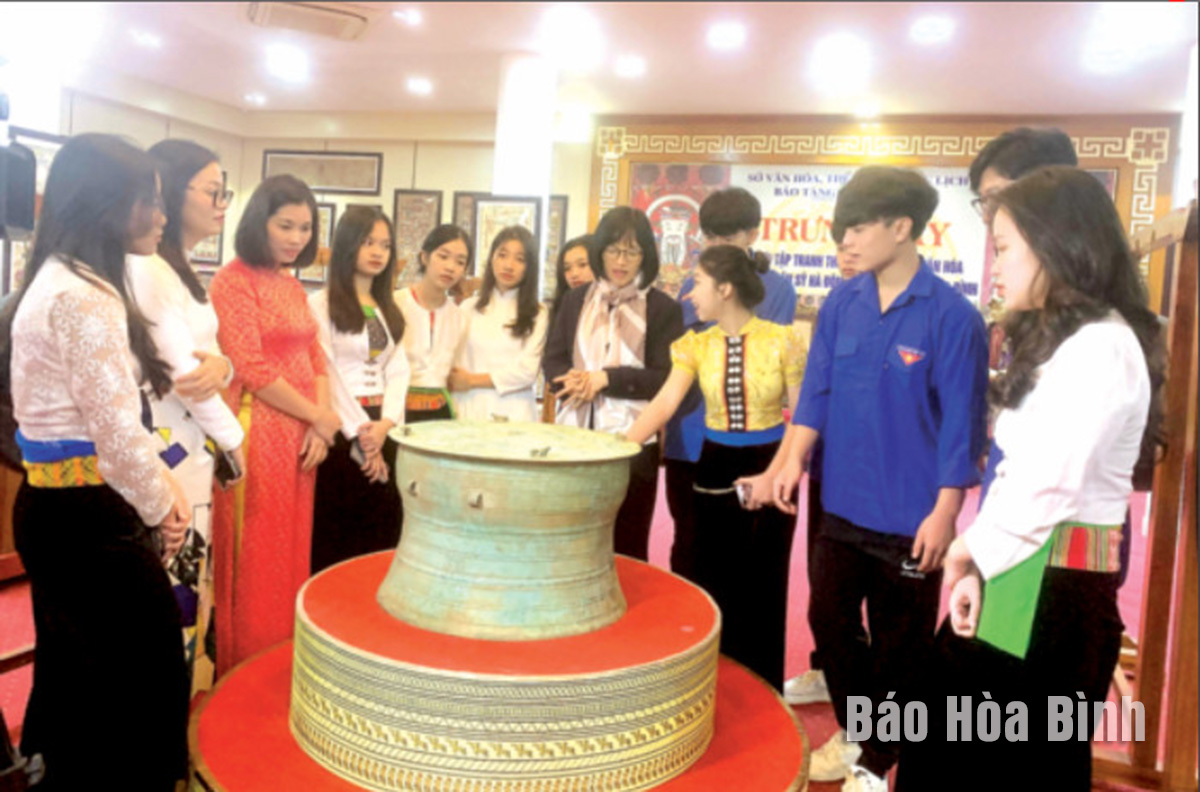
Bui Van Cuong, a local from Bo town of Hoa Binh’s Kim Boi district, has made his first visit to Chai village, Vong La commune of Hanoi’s outskirt Dong Anh district where late Party General Secretary Truong Chinh drafted the "Outline of Vietnamese Culture”, the first platform on culture 81 years ago. For Vietnamese culture lovers like Cuong, the historical relic site is a must-visit place.
Cuong held that the platform helped unlock the sources of national culture in
the context of accelerating anti-imperialist and anti-feudalist movements
towards the August Revolution in 1945.
It showed the strategic vision and mindset of the Party on the significant role
of culture in the country’s revolution, contributing to shaping and promoting
the Vietnamese culture in the Ho Chi Minh era, affirming that the Party’s
leadership over culture is a political necessity and an objective need, said Cuong.
Introduced in 1943, the "Outline of Vietnamese Culture” defined three movement
principles in culture: nationalisation, popularisation, and scientification.
These are still seen as fundamental principles guiding the development of the
Vietnamese culture.
The spirit of the document was associated to the Resolution of the fifth
plenary session of the 8th Party Central Committee and the Resolution of the
ninth session of the 11th Party Central Committee, which are important
documents released by the Party on the development of the Vietnamese culture in
the new period.
Particularly, after the 13th National Party Central Committee and the national
conference on culture in 2021, Party Committees and administrations at all
levels have determined to implement tasks in cultural development.
Hoa Binh, a Muong region with rich cultural values, has made efforts with high
political determination to implement the "Outline of Vietnamese Culture”,
focusing on strengthening communications and popularisation of Party and
State’s policies and laws regarding cultural heritage. The province has
encouraged people from ethnic minority groups in the locality in general and
the Muong community in particular to maintain their good cultural traditions
and eliminate outdated customs and superstitions. It has educated the local
communities on legal regulations on cultural heritage, festivals, beliefs, and
religions, thus enhancing public awareness of protecting and promoting cultural
heritage and cultural values of the nation and their ethnic groups.
According to the provincial Department of Culture, Sports and Tourism, the
locality’s outstanding activities in maintaining the national cultural identity
included the implementation of projects to collect, research, and translate Mo
Muong verses, and the listing of local cultural heritages such as Gong and Khai
ha festivals.
Particularly, Hoa Binh has completed the building of the Muong language script,
which was approved by the provincial People’s Committee, serving the teaching
of the language in the province in the 2018-2025 period.
With an increasingly vibrant and widespread emulation movement aimed at building cultured residential areas and cultured families, Yen Thuy District has been making steady progress toward improving both the material and spiritual well-being of its people, while fostering a civilized, prosperous, beautiful, and progressive community.
Once lacking recreational spaces and community facilities, Residential Group 2 in Quynh Lam Ward (Hoa Binh City) has recently received attention for the construction of a new, spacious, and fully equipped cultural house. The project followed the model of state support combined with public contributions in both labor and funding.
The "All people unite to build cultural life" movement, which has been effectively integrated with Kim Boi district’s socio-economic development goals, is fostering a lively spirit of emulation across local residential areas, hamlets, villages, public agencies, and enterprises. In addition, through the initiative, traditional cultural values are being preserved and promoted, while community solidarity and mutual support in poverty reduction and economic development are being strengthened.
A working delegation of the Hoa Binh provincial People’s Committee led by its Permanent Vice Chairman Nguyen Van Toan on June 11 inspected the progress of a project to build the Mo Muong Cultural Heritage Conservation Space linked to tourism services in Hop Phong commune, Cao Phong district.
Born and growing in the heroic land of Muong Dong, Dinh Thi Kieu Dung, a resident in Bo town of Kim Boi district, in her childhood was nurtured by the sweet lullabies of her grandmother and mother. These melodies deeply imprinted on her soul, becoming an inseparable part of her love for her ethnic group's culture. For over 20 years, this love for her hometown has driven Dung to research, collect, and pass down the cultural values of the Muong people to future generations.
In the final days of May, the Ethnic Art Troupe of Hoa Binh Province organized performances to serve the people in remote, mountainous, and particularly disadvantaged areas within the province. These were not just ordinary artistic shows, but they were the meaningful journeys aimed at spreading cultural values, enhancing the spiritual life of the people and contributing to the preservation of ethnic minority cultural identities.


